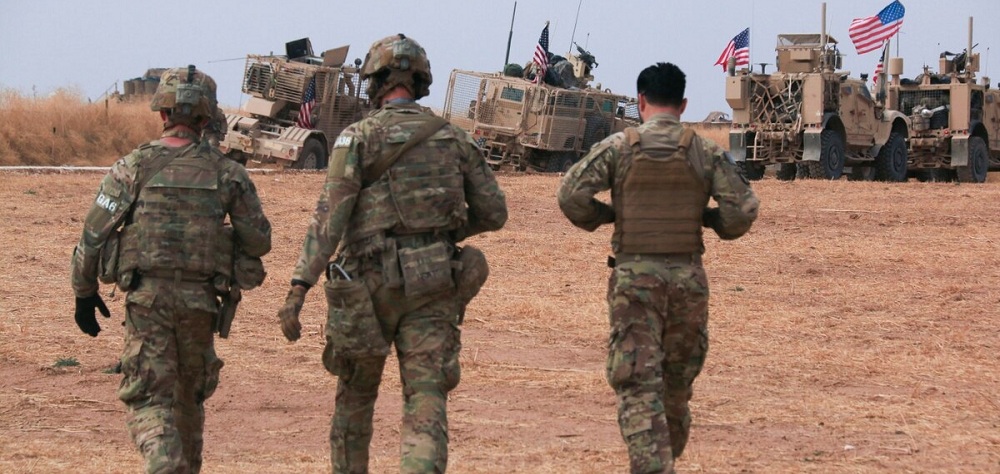Alwaght- While only 50 days separate Trump from evacuating the White House for next president, one of the main foreign policy matters of the US currently is the implementation of Trump’s “doctrine of withdrawal”, he promised during his campaign speeches. During his 2016 addresses, Donald Trump vowed to end the “endless” and resultless US wars and bring home the troops.
Perhaps initially this was regarded as a personal idea devoid of possibility of implementation. But the fact was that the US president was an outcome of a new reading of the international order equations, in the sense that unipolar order and the US play of world police role is no longer possible and that global players like China and Russia and even regional actors such as Turkey and Iran have a special place and play their own important role.
With these in mind and while only less than two months are left to the Trump presidency, the US has embarked on a strategy of military pullout from West Asia. Trump fired Defense Secretary Mark Esper and replaced him with acting Christopher Miller. Then other top Pentagon officials were told to resign.
In his first speech to the American forces, Miller expressed intention to accelerate the retreat from West Asia and Afghanistan. What demonstrates Miller’s seriousness is his hiring of Douglas MacGregor, who strongly advocates quick withdrawal from Afghanistan, as the top advisor to him. The pick makes the experts to hold that it is a sign of Pentagon’s plan for quick exit from the region, including Syria, before Trump’s term ends. MacGregor is prominent for his frequent calls for retreat of the American forces from Syria.
Still, some observers suggest that under Joe Biden the US will promote its military presence in eastern Syria and will offer bigger support to the Kurdish-held Syrian regions. While this suggestion insists that the Biden US and Kurds would have a bilateral will to keep the US forces in Syria, the argument in this article is that the Syria pullout decision is irreversible. In other words, perhaps this process will slow down under Biden, but exit of the US military from Syria would be a mater of compulsion.
Why is US retreat irreversible?
Over the past years, Trump used such words as retreat and withdrawal repeatedly in his talk of Syria strategy but it looks like the officials of the State and Defense departments came against the idea and even concealed realities from him. The resigned US envoy to Syria James Jeffrey admitted in mid-November hiding the US troops number from Trump.
“We were always playing shell games to not make clear to our leadership how many troops we had there,” Jeffrey said in an interview. The actual number of troops in northeast Syria is “a lot more than” the roughly two hundred troops Trump initially agreed to leave there in 2019, he said.
While the US retreat from eastern Syria in the remaining weeks of Trump presidency seems a hard job, just contrary to the analyses, the path of exit will be pursued under Biden. A couple of reasons lie behind this analysis.
1. At international levels, the equations have seriously changed. The US is no longer a top actor or world leader. Syria developments have indicated that the US is not even a third-rate actor in determination of the equations.
2. The Americans have not so far played an influential role in Syria from the viewpoint of the international legitimacy. Certainly, they will not secure a place in determination of the future political equations in the Arab country.
3. The US foreign policy has been set on withdrawal from West Asia and pivot to East Asia since the second term of Barack Obama presidency. Countering China power and influence gain makes up the linchpin of the US foreign policy. Change of the presidents and other officials can not change this now well-established approach.
4. Central Syrian government has international legitimacy and qualification to secure control over the whole territories of the country. Even if time-taking, this principle should be implemented at the end of the road. Not only the US but also all other uninvited foreign forces should leave Syria. This is undeniable and can be referred to as “historical determinism.”
Syrian Kurds, the losers of the American game
It was only with the US military assistance that the Syrian Kurds managed to gain control of about 20 percent of the country’s territory. But when it comes to political negotiations, not only Damascus but also other actors in Geneva and Astana peace initiatives consider no role or place for them. To put it precisely, they have no way but surrender to the government will and the US support for them will end in nothing but betrayal as history of the Kurdish ties to Washington can confirm.
In the new conditions, with the certainty of the US pullout from Syria, collapse of the self-proclaimed Kurdish administration north of Syria looks certain. The US retreat from Syria’s east will likely prompt immediate fall of the Kurdish autonomy which can resist neither Turkey nor central government. The most proper scenario for them now is dialogue and cooperation with Damascus. Such a path is definitely more logical for the Kurds than setting hopes on continuation of the US backing that is never permanent.



























